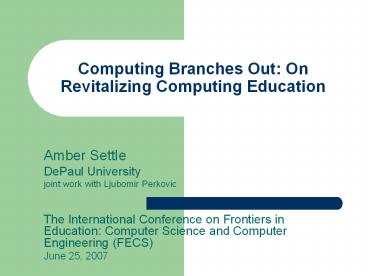Computing Branches Out: On Revitalizing Computing Education - PowerPoint PPT Presentation
Title:
Computing Branches Out: On Revitalizing Computing Education
Description:
Computer games development. Computer graphics and motion technology ... Computer Graphics and Motion Technology. Offered since 2001 ... – PowerPoint PPT presentation
Number of Views:63
Avg rating:3.0/5.0
Title: Computing Branches Out: On Revitalizing Computing Education
1
Computing Branches Out On Revitalizing Computing
Education
- Amber Settle
- DePaul University
- joint work with Ljubomir Perkovic
- The International Conference on Frontiers in
Education Computer Science and Computer
Engineering (FECS) - June 25, 2007
2
Crisis in CS education
- Computing is crucial in a long list of
professions - Includes manufacturing, the financial sector,
government, medicine, entertainment - Enrollment in CS programs has dropped
dramatically - Freshman entering the field in 2000 16,000
- Freshman entering the field in 2005 6,000
- Many reasons for this, including
- Traditional CS degrees focus on a large number of
foundation courses - Connection to area of interest is not immediately
obvious - Leaves little time for hands-on problem-solving
skills
3
A different model
- The CS situation
- 2,850,00 computing jobs
- Bureau of Labor Statistics Codes 15-1011 through
15-1099 - One formal degree program Computer science
- Related programs include math, sciences,
engineering - For contrast
- Approximately 1,450,000 engineers
- Bureau of Labor Statistics
- A multitude of formal degree programs
Electrical, chemical, mechanical, aerospace,
biomedical, civil, computer, environmental,
agricultural, nuclear, petroleum, mining, marine - Like engineering, computing education may benefit
from specialized degree programs
4
Two simultaneous approaches
- Multi-tracked computing education
- Multiple, specialized degree programs
- Better preparation for diverse computing jobs
- Clearer connection to area of interest
- Computing as general education
- Areas of broad interest to a wide range of
students - Traditional (databases, programming, web
development) - Non-traditional (gaming, animation, computer
graphics, etc.) - Knowledge of computing is vital for an educated
21st century college graduate
5
DePaul CTI programs
- DePauls School of Computer Science,
Telecommunications, and Information Systems (CTI) - Almost 80 fulltime faculty
- 14 bachelors degrees
- Almost 1000 undergraduates
- Computing degree programs include
- Computer games development
- Computer graphics and motion technology
- Information assurance and security engineering
- Network technology
- Computer science
- Each program has both foundations courses (may be
shared) and specialized courses (typically not
shared)
6
Sample courses by program
7
Distinctiveness of programs
8
Uniqueness of approach
- Not uncommon for computing schools/departments to
offer some specialized undergraduate programs - DePaul CTI offers a broad set of programs,
including some very unique ones - Computer Graphics and Motion Technology
- Offered since 2001
- One of only 10 programs listed in the ImageWorks
Professional Academic Excellence program - Information Assurance and Security Engineering
- One of the reasons CTI was designated a National
Center of Excellence in Information Assurance
Education by the National Security Agency and the
Department of Homeland Security - Only 64 such centers in U.S. few offer a full
security degree
9
Liberal Studies Program
- General education courses required of (nearly)
all DePaul undergraduates - Two types of requirements
- Common core (required of all)
- Composition and rhetoric, math and technology
literacy, Discover/Explore, Focal Point Seminar,
sophomore seminar on multiculturalism,
experiential learning, capstone - Domain courses (some student choice)
- Arts and Literature Philosophical Inquiry
Religious Dimensions Scientific Inquiry Self,
Society, and the Modern World Understanding the
Past - DePaul is a liberal arts university
- Up to 45 of the courses required for graduation
are in the LSP
10
CTI courses in the LSP
- Dramatic expansion in the past 5 years
- Domain courses
- 19 in Scientific Inquiry
- 10 in Arts and Literature
- 1 in Philosophical Inquiry
- 3 in Self, Society, and the Modern World
- 2 in Understanding the Past
- Common core
- Expansion in 2006-2007 to include a second
required mathematical/technological literacy
class with a focus on applications of mathematics
to technology - Experiential learning (including study abroad)
- Capstone courses
11
Popularity of CTI LSP courses
- Some examples from Fall 2007
- Number of sections typical for most quarters
- Domains
- Arts and Literature
- 4 sections of ANI 101
- 6 sections of DC 201
- 4 sections of GAM 224
- Philosophical Inquiry
- 2 sections of CSC 208
- Scientific Inquiry
- 9 sections of HCI 201
- 5 sections of IT 130
- Many other courses not listed
- Common core
- 20 sections of ISP 121
12
Impact on enrollments for majors
- During 2002-2004 total undergraduate enrollments
decreased 22 - In 2005-2006 the trend changed
- First-year undergraduate head counts up 55 in
Fall 2005 over Fall 2004 - Total CTI enrollments for Fall and Winter
2005-2006 were within 1 of enrollments in
2004-2005 - Improvements continue
- Fall 2006 had a 7 enrollment increase over Fall
2005 - CS freshman numbers up 20 for Fall 2007
13
Impact on enrollments for non-majors
14
Summary and future work
- Two-part approach to revitalizing computing
education - Multiple, distinct degree programs
- Integration of computing into general education
- Future work
- Evaluate effectiveness of existing programs
- Employer satisfaction data
- Comprehensive employment statistics for graduates
- Track affect of general education courses on
minors/majors - Development of a general multi-track approach to
computing education - Collaboration with multiple institutions
- NSF funding through the CPATH program































